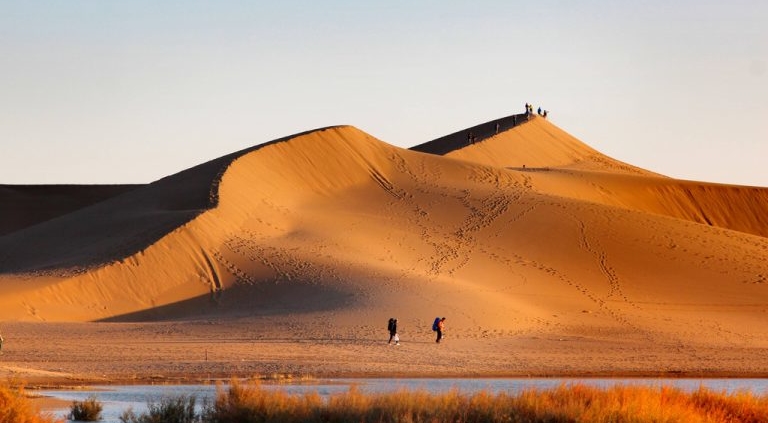Migrations: Three Lessons from the Migration (Hijra) of the Prophet Muhammad ﷺ – Shaykh Faraz Rabbani
: Play in a new window | Download to your device (15.5MB)
As we begin the new Hijri year, Shaykh Faraz reflects on the story of Prophet Muhammad’s (peace and blessings be upon him) migration (hijra). He focuses on three glimpses from that story and highlights some valuable and timely lessons. Among the lessons are: (1) how to plan and achieve goals, (2) doing the right thing with the right intention while relying fully on Allah, (3) displaying excellence in character, and (4) making all our choices for the sake of Allah and embracing the example of His Messenger (peace and blessings be upon him).
The first glimpse Shaykh Faraz recounts of the story of Prophet Muhammad’s (peace and blessings be upon him) migration (hijra), is in the phase of preparation. Sayyiduna Abu Bakr as-Siddiq (may Allah be pleased with him) had prepared well in advance by purchasing and equipping the camels for migration. He did not know the exact time of the migration, but was ready for it. In this we see the importance of taking the right means to achieve goals. Hope (raja’) is a praiseworthy trait. Hope is to wish for something pleasing while taking the right means that will result in the outcomes you wish for. Otherwise it is false hope and blameworthy. We also see in this event that the Prophet (peace and blessings be upon him) refused to take the camel he traveled on for free from Abu Bakr as-Siddiq (may Allah be pleased with him). He payed for it in full. We learn from this that one intends and strives to not be dependant.
The second glimpse Shaykh Faraz highlights is whenProphet Muhammad (peace and blessings be upon him) and Abu Bakr as-Siddiq (may Allah be pleased with him) headed out for the migration. Abu Bakr (may Allah be please with him) had deep concern for the Prophet (peace and blessings be upon him) and feared for any harm to befall him. So Abu Bakr would walk around theProphet (peace and blessings be upon him) to protect him from all directions. He entered the cave before the Prophet (peace and blessings be upon him) to try to secure it. And when the men from Quraysh caught up with them and stood right outside the cave, he expressed his fear that they may see them. However, the Prophet (peace and blessings be upon him) said as is narrated in the Qur’an: “Don’t worry, Allah is with us” [Surat al-Tawba, 40]. So when facing any trials and difficulties, remember Allah is with us. If you are doing the right thing with the right intention, even if things don’t work out, then you are successful with Allah.
The third glimpse covered by Shaykh Faraz is when theProphet (peace and blessings be upon him) passing by the tent of Umm Ma’bad in the middle of the desert. They were seeking milk to drink and found only a weak goat with her that didn’t give milk. The Prophet (peace and blessings be upon him) was granted the miracle of the goat producing abundant milk when he rubbed its udder. In this story, Umm Ma’bad recounts the event to her husband when he returns to the tent. She describes the amazing character and excellent character of theProphet (peace and blessings be upon him). She describes the dignity, beauty and virtue in dealing of theProphet (peace and blessings be upon him). Umm Ma’bad and her husband later became Muslims because of what they witnessed of the Prophet’s (peace and blessings be upon him) excellent character. As Muslims and followers of Prophet Muhammad (peace and blessings be upon him) should display excellence of character. This is how we uphold our connection to the Prophet (peace and blessings be upon him), by connecting to his character. The way to call to Allah starts with character not words.
Finally, Shaykh Faraz narrates the hadith of intentions, which is connected to the story of the migration. Prophet Muhammad (peace and blessings be upon him) said: “Actions are by their intentions, and each person shall have whatever they intended. So whoever’s migration was to Allah and His Messenger, then their migration was to Allah and His Messenger. And whoever’s migration was for some worldly gain, or for a woman to marry, then their migration is for whatever they migrated for.” [Narrated by Bukhari and Muslim] In our life every choice of ours is like a migration, and every choice is by its intention. Make it a choice for Allah and His Messenger. Seeking Allah and embracing the beautiful example of the Messenger.
This Friday sermon was delivered in September of 2017 at the International Muslims Organization of Toronto (IMO) (http://imooftoronto.com/).
Checkout all of the SeekersGuidance podcasts by visiting https://seekersguidance.org/podcasts/
